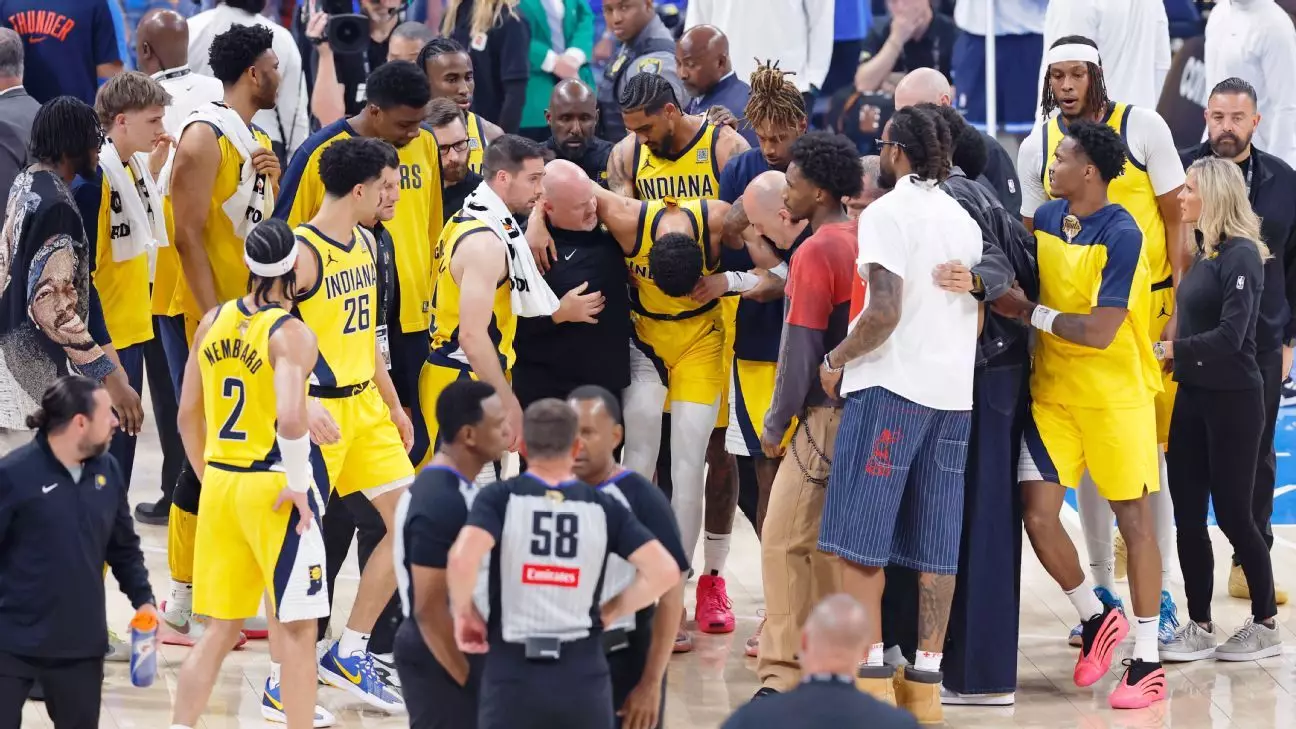Tyrese Haliburton’s recent social media outpouring epitomizes the essence of sportsmanship and resilience. After sustaining a devastating injury during Game 7 of the NBA Finals, Haliburton reflected on the harrowing journey he undertook—possessing an unwavering resolve to fight for his team even under precarious circumstances. His declaration, “I’d do it again, and again after that,” has stirred discussions not merely about athletic dedication but also about the emotional gambles athletes make for the love of their sport and their teammates. It’s a testament to the heart of youth in a high-stakes environment, but it overrides the conversation about injury management and player welfare that often gets sidelined.
Certainly, Haliburton’s determination is admirable; it resonates with anyone who has ever felt the burning desire to push through challenges for something greater than oneself. Yet, as a proponent of responsible sports culture and player safety, one can only wonder about the wisdom of his choices. Haliburton played through a calf strain and ultimately paid a grave price—tearing his Achilles tendon. This situation begs the question: at what cost does passion for one’s team translate into reckless abandon? His bravado is refreshing, yet the implications for future athletes who may emulate such an approach raise alarm bells.
Emotional Turmoil and the Cost of Dedication
Haliburton indeed encapsulated the emotional turmoil athletes often experience in the wake of physical setbacks. He described feeling ‘shock’ and ‘unfathomable frustration’; sentiments that are shared by countless players who experience injuries during pivotal moments of their careers. His remarks about the pain of disappointment reveal a deeper layer of vulnerability often hidden beneath the polished surface of professional sports. The expectation to perform against all odds creates a poignant psychological struggle, one that, when left unchecked, can lead to mental health issues down the road.
Addressing mental well-being is a vital conversation that should accompany any discussion about player injuries. Haliburton’s post about battling with feelings of sadness and letting off steam through dialogue—without the façade of strength—is emblematic of a shifting paradigm in sports culture. It invites aspiring athletes to realize that acknowledging pain, both physical and emotional, is not a weakness but rather a form of courage.
A Cliché Suspended in Uncertainty
Haliburton’s sharp critique of the cliché, “you’ll come back stronger,” adds a stark realism to the façade of optimism often propagated by coaches, teammates, and fans alike in sports. He humorously dismisses it, yet behind that humor lies the grim reality of recovery: that returning to form after a significant injury is fraught with uncertainty, both physically and psychologically. The culture of pushing athletes to return too quickly can be detrimental, and Haliburton’s candidness serves as a necessary counter-narrative that questions whether quick recoveries are truly in the best interest of those involved.
As he undergoes rehabilitation and faces the daunting year ahead, one can’t help but ponder if Haliburton might well emerge with more than just a physical healing. This setback—while tragic—could serve as a transformative period in his life. Athletes often grapple with their identity being closely tied to their sport, and in moments of crisis, it becomes imperative to find out who they are beyond the game. Haliburton’s reflections could inspire not only himself but others, rethinking what it means to be an athlete in today’s culture and foster a deeper understanding around the narratives of recovery.
A Call for Empathy and Understanding
As fans, we must respond to Haliburton’s experience with empathy and an understanding of the emotional labyrinth that accompanies athletic performance. His fight for the Pacers, although it ended in disappointment, encapsulates a broader tale: summed not just in accolades but in human fragility. The sheer will to succeed, coupled with the harsh realities of sports, must serve as a reminder that athletes are not merely machines. They endure their share of emotional struggles, and admitting vulnerability can become a vital part of their journey.
Haliburton’s story illustrates how the sport of basketball—and indeed all competitive sports—shapes individuals not only in tears of celebration but also in the tears of pain. As he embarks on a prolonged road to recovery, sports enthusiasts should embrace a new narrative, one that is less about the glory of returning and more about nurturing mental fortitude and holistic well-being. While the specifics of Haliburton’s journey are unique, the underlying theme is universal; we must support athletes, not just as performers but as whole persons navigating the complexities of life.



Leave a Reply